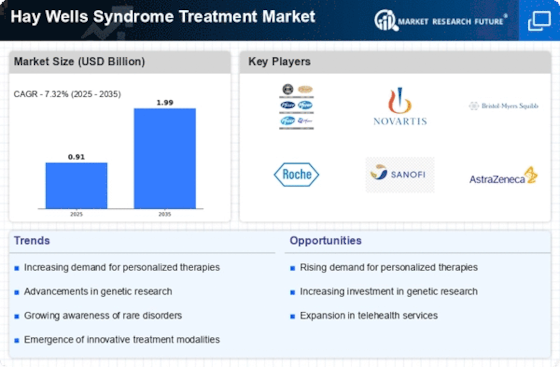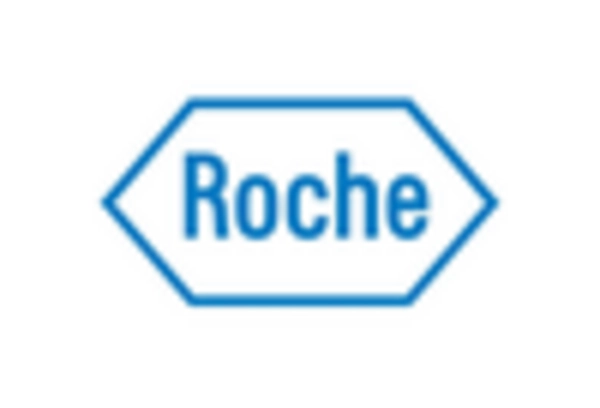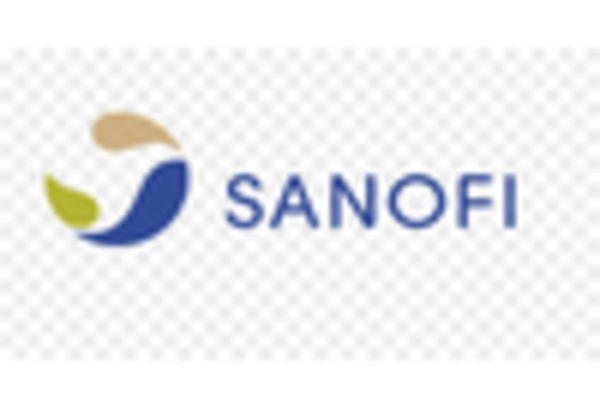Advancements in Genetic Research
Ongoing advancements in genetic research significantly influence the Hay Wells Syndrome Treatment Market. The identification of specific genetic mutations associated with Hay Wells Syndrome has opened new avenues for targeted therapies. Researchers are increasingly focusing on gene therapy and personalized medicine, which may offer more effective treatment options tailored to individual patients. This shift towards precision medicine is likely to enhance treatment outcomes and improve the quality of life for those affected by the syndrome. Furthermore, the integration of cutting-edge technologies, such as CRISPR and gene editing, holds promise for future therapeutic developments. As these innovations continue to evolve, they are expected to drive investment and interest in the Hay Wells Syndrome Treatment Market, fostering a competitive landscape among pharmaceutical companies.
Increased Awareness and Advocacy
The growing awareness and advocacy surrounding Hay Wells Syndrome play a crucial role in shaping the Hay Wells Syndrome Treatment Market. Non-profit organizations and patient advocacy groups are actively working to educate the public and healthcare professionals about the condition. This heightened awareness is likely to lead to earlier diagnoses and increased demand for treatment options. Additionally, advocacy efforts are pushing for more funding and resources dedicated to research and development in this area. As a result, pharmaceutical companies may be more inclined to invest in the development of new therapies, knowing that there is a supportive community advocating for patients. This trend not only benefits those affected by Hay Wells Syndrome but also contributes to the overall growth of the treatment market.
Rising Prevalence of Hay Wells Syndrome
The increasing incidence of Hay Wells Syndrome is a primary driver for the Hay Wells Syndrome Treatment Market. Recent estimates suggest that the prevalence of this genetic disorder is on the rise, leading to heightened awareness and demand for effective treatment options. As more individuals are diagnosed, healthcare providers are compelled to seek innovative therapies and management strategies. This trend is further supported by advancements in genetic testing, which facilitate earlier diagnosis and intervention. Consequently, pharmaceutical companies are investing in research and development to create targeted therapies that address the specific needs of patients with Hay Wells Syndrome. The growing patient population is likely to stimulate market growth, as stakeholders recognize the necessity for comprehensive treatment solutions.
Collaboration Between Academia and Industry
The collaboration between academic institutions and the pharmaceutical industry is emerging as a vital driver for the Hay Wells Syndrome Treatment Market. These partnerships facilitate the exchange of knowledge and resources, accelerating the development of new therapies. Academic researchers often possess deep insights into the genetic and molecular mechanisms underlying Hay Wells Syndrome, while pharmaceutical companies bring expertise in drug development and commercialization. This synergy can lead to the identification of novel therapeutic targets and the creation of innovative treatment strategies. Furthermore, collaborative research initiatives may attract funding and investment, enhancing the overall capacity for research in this field. As these partnerships continue to grow, they are expected to play a pivotal role in advancing the Hay Wells Syndrome Treatment Market, ultimately benefiting patients and healthcare providers alike.
Regulatory Support for Innovative Therapies
Regulatory bodies are increasingly supportive of innovative therapies for rare genetic disorders, including Hay Wells Syndrome. This regulatory environment is a significant driver for the Hay Wells Syndrome Treatment Market. Initiatives aimed at expediting the approval process for orphan drugs and therapies designed for rare conditions are becoming more prevalent. Such measures encourage pharmaceutical companies to invest in research and development, knowing that there is a pathway for bringing their products to market more efficiently. The potential for fast-tracked approvals and incentives for developing treatments for Hay Wells Syndrome may lead to a surge in new therapies entering the market. This supportive regulatory landscape is likely to foster innovation and competition, ultimately benefiting patients seeking effective treatment options.

















Leave a Comment